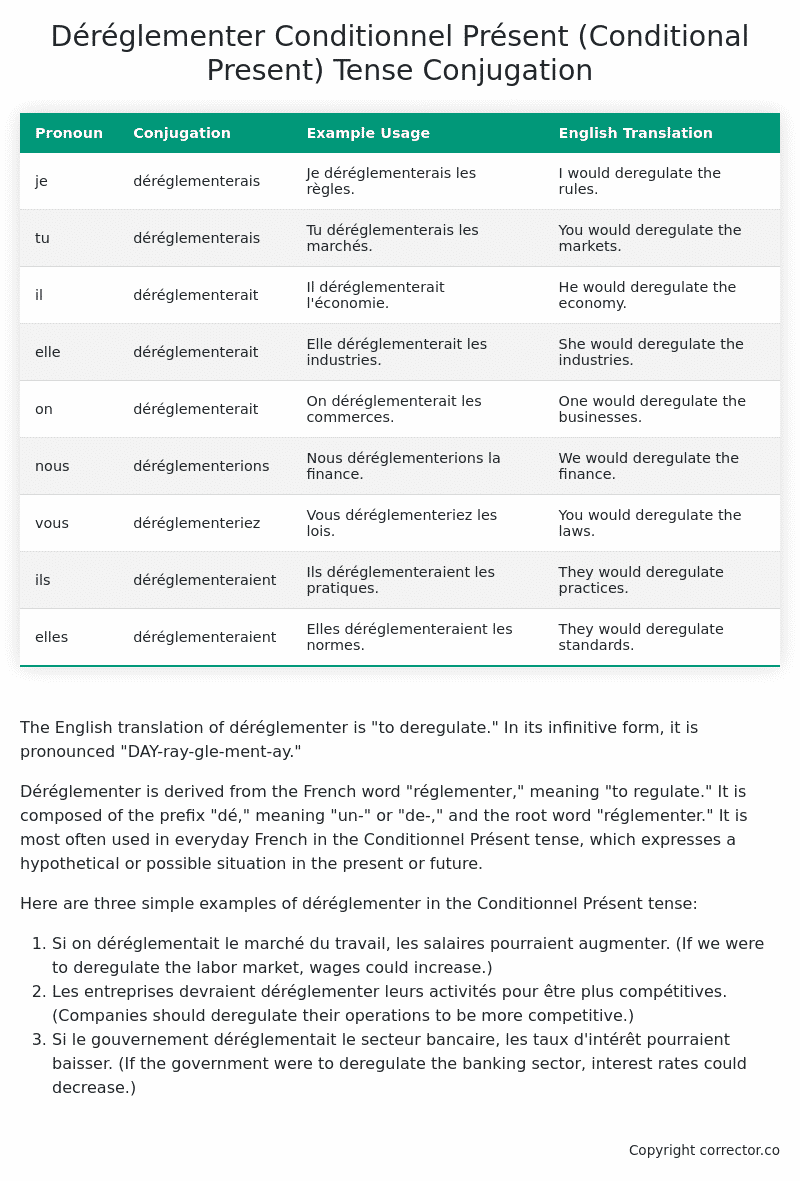Conditionnel Présent (Conditional Present) Tense Conjugation of the French Verb déréglementer
Introduction to the verb déréglementer
The English translation of déréglementer is “to deregulate.” In its infinitive form, it is pronounced “DAY-ray-gle-ment-ay.”
Déréglementer is derived from the French word “réglementer,” meaning “to regulate.” It is composed of the prefix “dé,” meaning “un-” or “de-,” and the root word “réglementer.” It is most often used in everyday French in the Conditionnel Présent tense, which expresses a hypothetical or possible situation in the present or future.
Here are three simple examples of déréglementer in the Conditionnel Présent tense:
- Si on déréglementait le marché du travail, les salaires pourraient augmenter. (If we were to deregulate the labor market, wages could increase.)
- Les entreprises devraient déréglementer leurs activités pour être plus compétitives. (Companies should deregulate their operations to be more competitive.)
- Si le gouvernement déréglementait le secteur bancaire, les taux d’intérêt pourraient baisser. (If the government were to deregulate the banking sector, interest rates could decrease.)
Table of the Conditionnel Présent (Conditional Present) Tense Conjugation of déréglementer
| Pronoun | Conjugation | Example Usage | English Translation |
|---|---|---|---|
| je | déréglementerais | Je déréglementerais les règles. | I would deregulate the rules. |
| tu | déréglementerais | Tu déréglementerais les marchés. | You would deregulate the markets. |
| il | déréglementerait | Il déréglementerait l’économie. | He would deregulate the economy. |
| elle | déréglementerait | Elle déréglementerait les industries. | She would deregulate the industries. |
| on | déréglementerait | On déréglementerait les commerces. | One would deregulate the businesses. |
| nous | déréglementerions | Nous déréglementerions la finance. | We would deregulate the finance. |
| vous | déréglementeriez | Vous déréglementeriez les lois. | You would deregulate the laws. |
| ils | déréglementeraient | Ils déréglementeraient les pratiques. | They would deregulate practices. |
| elles | déréglementeraient | Elles déréglementeraient les normes. | They would deregulate standards. |
Other Conjugations for Déréglementer.
Le Present (Present Tense) Conjugation of the French Verb déréglementer
Imparfait (Imperfect) Tense Conjugation of the French Verb déréglementer
Passé Simple (Simple Past) Tense Conjugation of the French Verb déréglementer
Passé Composé (Present Perfect) Tense Conjugation of the French Verb déréglementer
Futur Simple (Simple Future) Tense Conjugation of the French Verb déréglementer
Futur Proche (Near Future) Tense Conjugation of the French Verb déréglementer
Plus-que-parfait (Pluperfect) Tense Conjugation of the French Verb déréglementer
Passé Antérieur (Past Anterior) Tense Conjugation of the French Verb déréglementer
Futur Antérieur (Future Anterior) Tense Conjugation of the French Verb déréglementer
Subjonctif Présent (Subjunctive Present) Tense Conjugation of the French Verb déréglementer
Subjonctif Passé (Subjunctive Past) Tense Conjugation of the French Verb déréglementer
Subjonctif Imparfait (Subjunctive Imperfect) Tense Conjugation of the French Verb déréglementer
Conditionnel Présent (Conditional Present) Tense Conjugation of the French Verb déréglementer (this article)
Conditionnel Passé (Conditional Past) Tense Conjugation of the French Verb déréglementer
L’impératif Présent (Imperative Present) Tense Conjugation of the French Verb déréglementer
L’infinitif Présent (Infinitive Present) Tense Conjugation of the French Verb déréglementer
Struggling with French verbs or the language in general? Why not use our free French Grammar Checker – no registration required!
Get a FREE Download Study Sheet of this Conjugation 🔥
Simply right click the image below, click “save image” and get your free reference for the déréglementer Conditionnel Présent tense conjugation!

Déréglementer – About the French Conditionnel Présent (Conditional Present) Tense
Formation
Common Everyday Usage Patterns
Expressing Polite Requests
Expressing Hypothetical Situations
Expressing Doubt or Uncertainty
Interactions with Other Tenses
Present Tense
Past Tense
Future Tense
Conditional Perfect
Summary
Want More?
I hope you enjoyed this article on the verb déréglementer. Still in a learning mood? Check out another TOTALLY random French verb conjugation!


